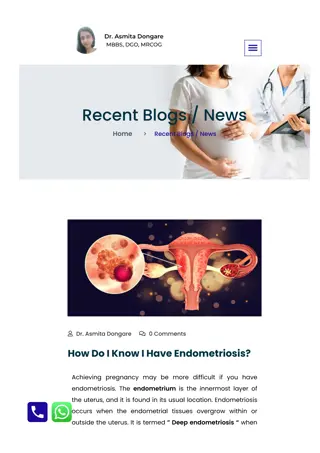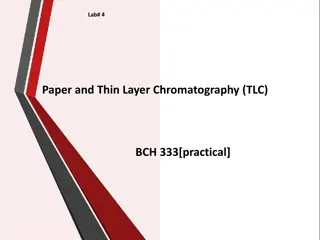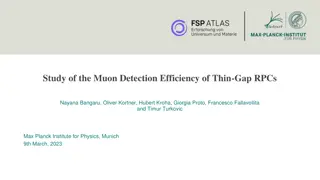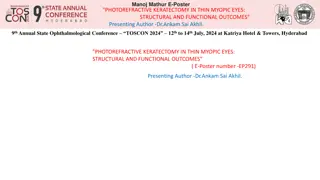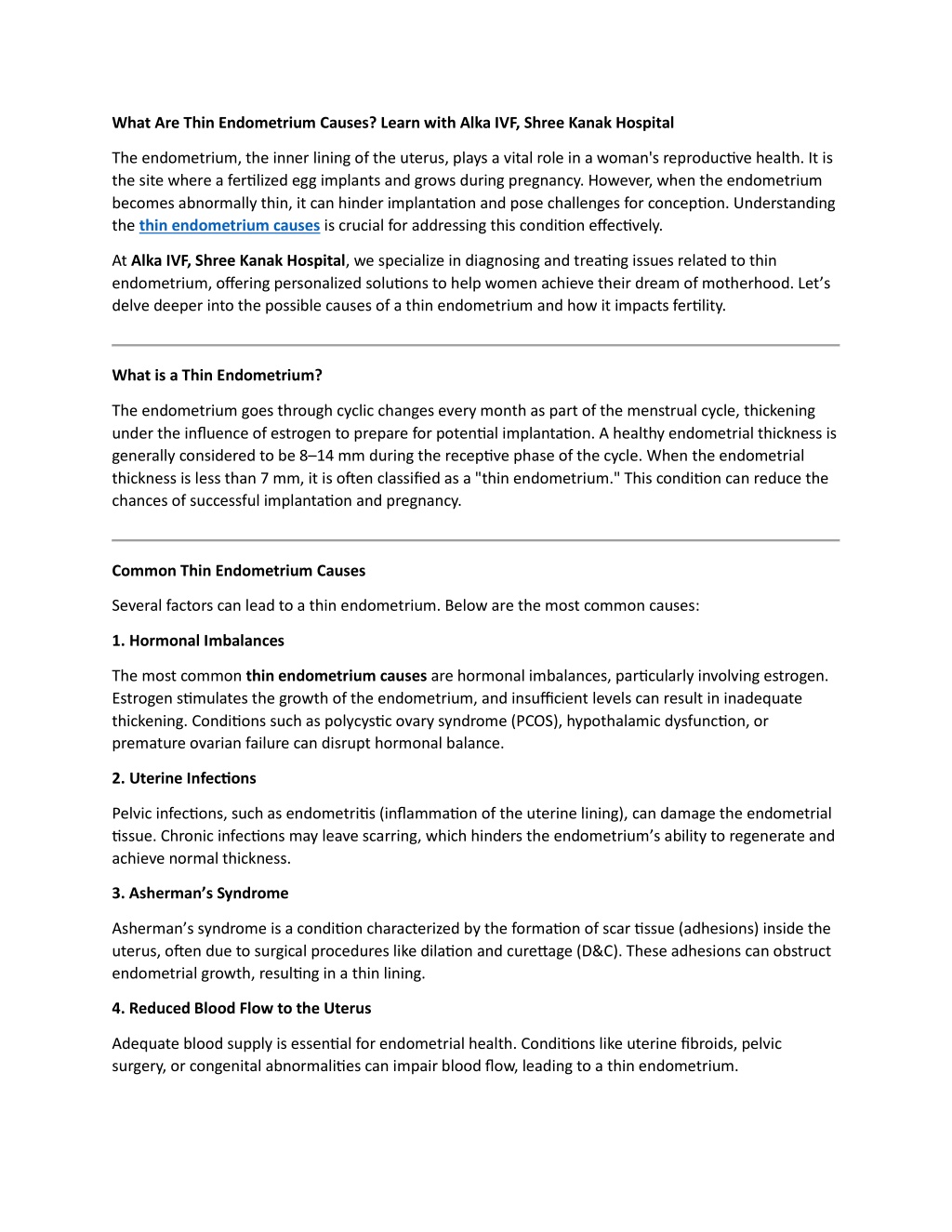
What Are Thin Endometrium Causes 23 nov.
thin endometrium causes
Download Presentation

Please find below an Image/Link to download the presentation.
The content on the website is provided AS IS for your information and personal use only. It may not be sold, licensed, or shared on other websites without obtaining consent from the author. Download presentation by click this link. If you encounter any issues during the download, it is possible that the publisher has removed the file from their server.
E N D
Presentation Transcript
What Are Thin Endometrium Causes? Learn with Alka IVF, Shree Kanak Hospital The endometrium, the inner lining of the uterus, plays a vital role in a woman's reproductive health. It is the site where a fertilized egg implants and grows during pregnancy. However, when the endometrium becomes abnormally thin, it can hinder implantation and pose challenges for conception. Understanding the thin endometrium causes is crucial for addressing this condition effectively. At Alka IVF, Shree Kanak Hospital, we specialize in diagnosing and treating issues related to thin endometrium, offering personalized solutions to help women achieve their dream of motherhood. Let s delve deeper into the possible causes of a thin endometrium and how it impacts fertility. What is a Thin Endometrium? The endometrium goes through cyclic changes every month as part of the menstrual cycle, thickening under the influence of estrogen to prepare for potential implantation. A healthy endometrial thickness is generally considered to be 8 14 mm during the receptive phase of the cycle. When the endometrial thickness is less than 7 mm, it is often classified as a "thin endometrium." This condition can reduce the chances of successful implantation and pregnancy. Common Thin Endometrium Causes Several factors can lead to a thin endometrium. Below are the most common causes: 1. Hormonal Imbalances The most common thin endometrium causes are hormonal imbalances, particularly involving estrogen. Estrogen stimulates the growth of the endometrium, and insufficient levels can result in inadequate thickening. Conditions such as polycystic ovary syndrome (PCOS), hypothalamic dysfunction, or premature ovarian failure can disrupt hormonal balance. 2. Uterine Infections Pelvic infections, such as endometritis (inflammation of the uterine lining), can damage the endometrial tissue. Chronic infections may leave scarring, which hinders the endometrium s ability to regenerate and achieve normal thickness. 3. Asherman s Syndrome Asherman s syndrome is a condition characterized by the formation of scar tissue (adhesions) inside the uterus, often due to surgical procedures like dilation and curettage (D&C). These adhesions can obstruct endometrial growth, resulting in a thin lining. 4. Reduced Blood Flow to the Uterus Adequate blood supply is essential for endometrial health. Conditions like uterine fibroids, pelvic surgery, or congenital abnormalities can impair blood flow, leading to a thin endometrium.
5. Certain Medications Some medications, particularly those used in cancer treatments or hormonal therapies, may negatively impact endometrial growth. For instance, prolonged use of clomiphene citrate, a common fertility medication, has been associated with thinner endometrial linings in some women. 6. Lifestyle Factors Lifestyle choices such as smoking, excessive alcohol consumption, and high levels of stress can contribute to poor endometrial health. These factors may disrupt hormonal function or blood flow to the uterus. How a Thin Endometrium Affects Fertility A thin endometrium poses significant challenges for women trying to conceive. Without sufficient thickness, the endometrium cannot support the implantation of a fertilized embryo, leading to recurrent implantation failure or early miscarriage. For women undergoing fertility treatments, such as in vitro fertilization (IVF), a thin endometrium may reduce the chances of success. Diagnosing Thin Endometrium At Alka IVF, Shree Kanak Hospital, diagnosing a thin endometrium involves a thorough evaluation, including: Ultrasound Imaging: A transvaginal ultrasound is commonly used to measure endometrial thickness and assess its structure. Hormonal Testing: Blood tests are conducted to evaluate estrogen levels and other hormones that influence endometrial health. Hysteroscopy: This procedure allows doctors to visually examine the uterine cavity for scarring, adhesions, or other abnormalities. Endometrial Biopsy: A biopsy may be performed to assess the tissue s health and rule out chronic infections. Treatment Options for Thin Endometrium Effective treatments for a thin endometrium depend on addressing the underlying causes. At Alka IVF, Shree Kanak Hospital, we offer a range of advanced therapies: 1. Hormonal Therapy Estrogen therapy is often prescribed to promote endometrial growth. In cases of hormonal imbalance, medications like progesterone or gonadotropins may also be used to regulate the menstrual cycle.
2. Platelet-Rich Plasma (PRP) Therapy PRP therapy is an innovative treatment that involves injecting growth factors derived from the patient s own blood into the uterus to stimulate endometrial regeneration. 3. Lifestyle Modifications Improving lifestyle factors such as adopting a balanced diet, quitting smoking, and managing stress can significantly enhance endometrial health. 4. Hysteroscopic Surgery For women with Asherman s syndrome or uterine adhesions, hysteroscopic surgery can remove scar tissue and restore the uterine cavity, improving endometrial thickness. 5. Fertility Treatments For women undergoing IVF, advanced protocols are used to maximize endometrial receptivity. Techniques such as endometrial scratching or embryo freezing may be employed to enhance the chances of implantation. Why Choose Alka IVF, Shree Kanak Hospital? At Alka IVF, Shree Kanak Hospital, we are committed to providing cutting-edge fertility care with a compassionate approach. Our experienced team of specialists uses state-of-the-art technology to diagnose and treat thin endometrium causes, ensuring the best possible outcomes for our patients. Whether through hormonal therapy, surgical intervention, or advanced fertility treatments, we tailor our solutions to meet your individual needs. Conclusion Understanding the thin endometrium causes is the first step toward effective treatment and improved fertility outcomes. With expertise and personalized care, Alka IVF, Shree Kanak Hospital is dedicated to helping women overcome challenges associated with a thin endometrium and achieve successful pregnancies. If you are struggling with infertility or suspect a thin endometrium may be the cause, don t hesitate to consult our specialists. Together, we can pave the way to a brighter future.



